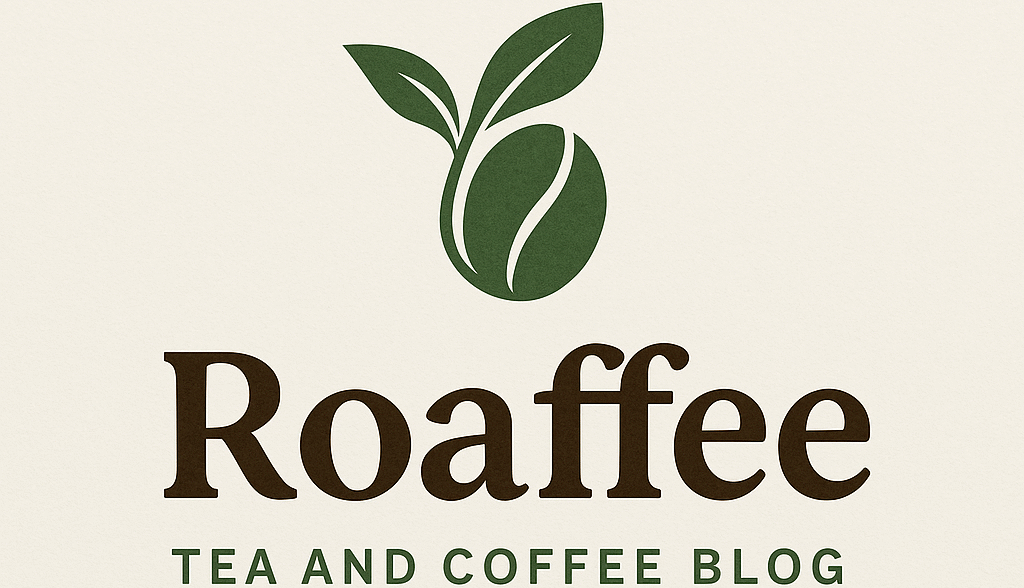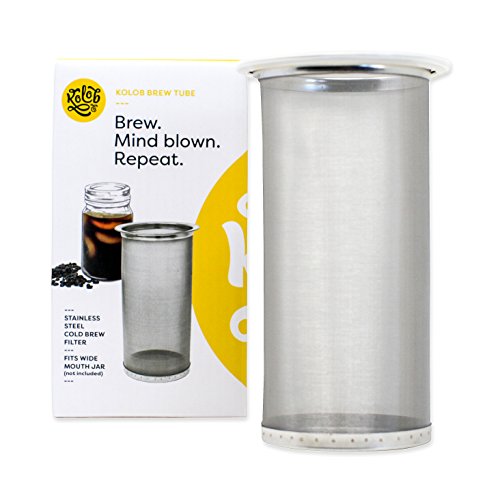New motherhood brings incredible joy alongside physical and emotional challenges that require gentle support. We’ve crafted this nourishing postpartum tea recipe to help your body recover naturally while providing the comfort you deserve during this groundbreaking time.
This healing blend combines traditional herbs known for their restorative properties with modern nutritional wisdom. Each ingredient works synergistically to support lactation, reduce inflammation, and promote overall wellness when you need it most. The warming spices not only create a deliciously soothing flavor but also aid digestion and circulation.
We understand that as a new mom, you’re looking for simple yet effective ways to care for yourself. This tea takes just minutes to prepare and can be enjoyed hot or cold throughout your day. Whether you’re nursing in the quiet morning hours or winding down in the evening, this blend offers a moment of peaceful self-care that your body will thank you for.
What Is Postpartum Tea
Postpartum tea is a carefully crafted herbal blend specifically designed to support new mothers during the recovery period after childbirth. We define this therapeutic beverage as a combination of traditional healing herbs and modern nutritional wisdom that addresses the unique physical and emotional needs of the postpartum experience.
The healing properties of postpartum tea stem from centuries of traditional practices across various cultures. Ancient midwives and herbalists recognized that certain plants could help restore balance to the body after the intense process of pregnancy and birth. We see this wisdom reflected in the careful selection of herbs that target exact postpartum concerns.
Our postpartum tea blend focuses on three primary areas of support: lactation enhancement, inflammation reduction, and overall wellness promotion. Each herb serves a exact purpose in this holistic approach to recovery. Red raspberry leaf strengthens the reproductive system while nettle provides essential minerals that may be depleted during pregnancy and breastfeeding.
The anti-inflammatory properties of chamomile and ginger work together to soothe both body and mind. Chamomile offers gentle relaxation benefits while ginger supports healthy digestion and circulation. These warming spices create a comforting experience that extends beyond mere nutrition.
We emphasize that postpartum tea differs from regular herbal teas in its targeted formulation. The herbs are selected based on their documented benefits for new mothers rather than general wellness purposes. This specialized approach ensures that each cup delivers maximum therapeutic value during this critical recovery period.
The preparation and consumption of postpartum tea also serves as a mindful ritual for new mothers. Taking time to brew and enjoy this nourishing beverage creates moments of self-care that are essential for emotional well-being. We believe this ritualistic aspect contributes significantly to the overall healing experience.
Benefits of Postpartum Tea

Our carefully crafted postpartum tea blend offers comprehensive support during the critical recovery period following childbirth. These therapeutic benefits address the unique physical and emotional challenges new mothers face.
Supporting Recovery
The postpartum period demands intensive nutritional support as our bodies work to heal and restore balance. Our tea blend replenishes essential nutrients, minerals, and vitamins that become depleted after birth, accelerating recovery and restoring energy levels naturally.
The roasted rice component in traditional formulations provides particular digestive benefits by warming the stomach and supporting proper nutrient absorption. This gentle warming effect helps vulnerable postpartum bodies adjust more comfortably to the healing process. Our blend also supports uterine health and hormone regulation, creating conditions for a smoother postpartum transition.
Recovery extends beyond physical healing to cover emotional wellness. The ritual of preparing and sipping warm tea provides structured moments of self-care that contribute significantly to overall recovery outcomes.
Boosting Milk Supply
Lactation support represents one of the most valued benefits of postpartum tea consumption. Our blend includes herbs like red raspberry leaf that have been traditionally used to support healthy milk production and potentially enhance milk quality.
The hydration aspect of regular tea consumption plays a crucial role in maintaining adequate milk supply. Breastfeeding mothers require increased fluid intake to support their body’s milk production demands. Our caffeine-free formulation ensures this hydration support without interfering with sleep patterns or affecting nursing babies.
While traditional use suggests effectiveness in supporting lactation, we acknowledge that scientific evidence continues to develop about exact mechanisms and outcomes.
Promoting Relaxation
The postpartum period brings intense physical and emotional demands that can create heightened stress levels. Our tea blend contains calming herbs specifically chosen to help reduce anxiety and promote essential rest during this groundbreaking time.
These relaxation benefits extend beyond immediate stress relief to support better sleep quality when opportunities for rest arise. The warm, comforting nature of tea consumption itself creates a meditative experience that encourages mindful moments throughout demanding days.
Regular consumption of our postpartum tea helps establish a consistent self-care routine that signals to both body and mind that relaxation and recovery remain priorities during this intensive period.
Essential Ingredients for Postpartum Tea

We’ve carefully selected five key ingredients that form the foundation of our healing postpartum tea blend. Each herb brings unique therapeutic properties that address the exact recovery needs of new mothers.
Red Raspberry Leaf
Red raspberry leaf serves as the cornerstone of our postpartum tea blend because of its exceptional ability to strengthen the uterus and support recovery. This mineral-rich herb provides essential nutrients that help rebuild strength after childbirth while promoting restful sleep during those challenging early weeks. We value red raspberry leaf for its gentle yet effective approach to postpartum healing, making it an indispensable component of our therapeutic blend.
Nettle Leaf
Nettle leaf stands out as a nutritional powerhouse that addresses the common challenge of postpartum fatigue. Rich in iron and other vital nutrients, this herb naturally boosts overall vitality while supporting healthy milk supply for nursing mothers. We include nettle leaf in our blend because it effectively combats the exhaustion that often accompanies new motherhood, providing sustained energy without artificial stimulants.
Chamomile
Chamomile brings gentle calming properties to our postpartum tea, offering much-needed stress relief during this intense period of adjustment. This soothing herb helps promote better sleep quality, which becomes precious when caring for a newborn disrupts normal rest patterns. We appreciate chamomile’s ability to provide emotional support through its natural relaxation benefits, making it essential for mental well-being during postpartum recovery.
Fennel Seeds
Fennel seeds serve a dual purpose in our postpartum tea by stimulating milk glands to enhance lactation while addressing digestive concerns. These aromatic seeds help alleviate digestive issues that commonly affect both breastfeeding mothers and their babies through breast milk. We rely on fennel seeds to naturally support milk production, making them particularly valuable for mothers who want to maintain a healthy nursing relationship.
Rose Hips
Rose hips complete our postpartum tea blend by adding natural flavor while delivering essential vitamin C for immune support. These vibrant additions provide powerful antioxidant benefits that help protect against illness during the vulnerable postpartum period. We include rose hips not only for their nutritional value but also for their ability to create a pleasant, slightly tart flavor that makes our healing tea enjoyable to drink throughout the day.
Equipment Needed
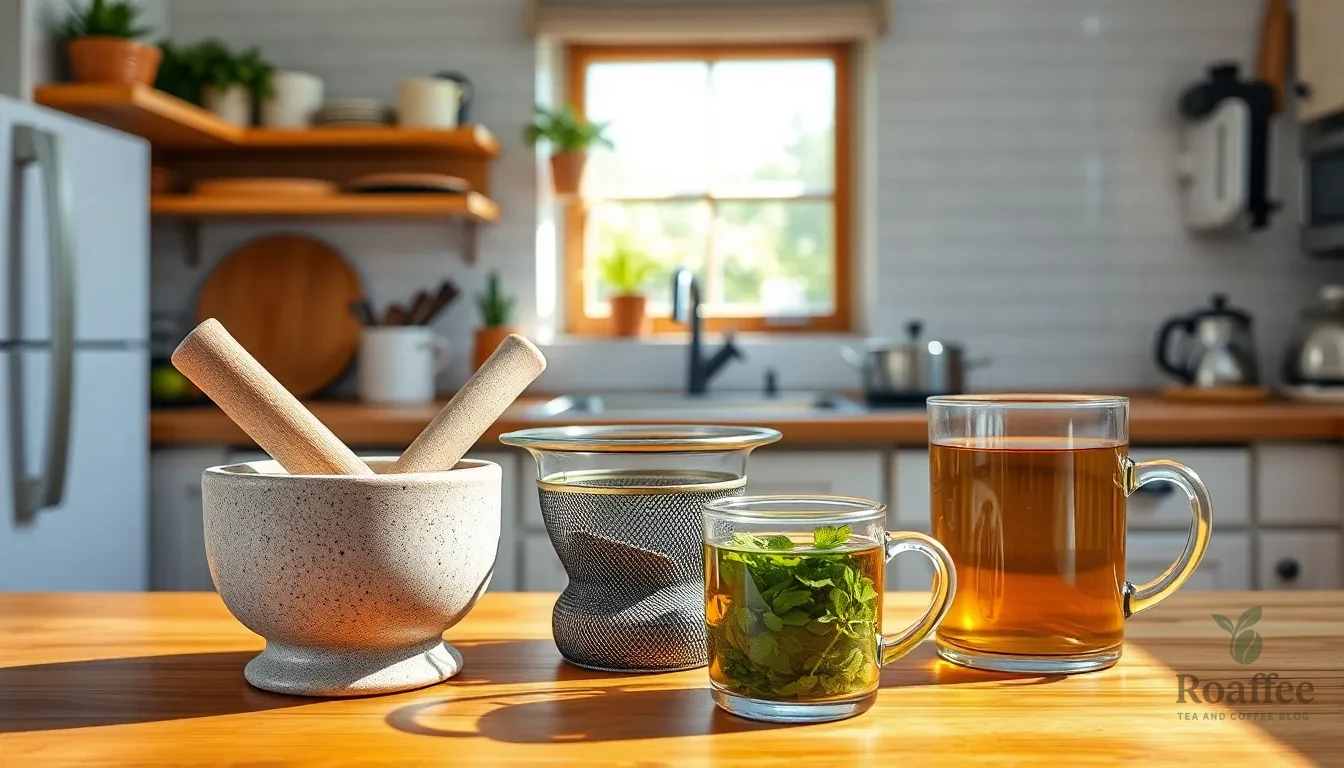
Preparing our nourishing postpartum tea requires basic kitchen tools that most home cooks already have available. We recommend gathering these essential items before beginning the brewing process to ensure smooth preparation.
Mortar and Pestle
This traditional tool becomes crucial for crushing cardamom pods and chopping fresh ginger effectively. We find that crushing spices releases their essential oils more thoroughly than using pre-ground alternatives. The mortar and pestle allows us to control the texture and intensity of our spice blend.
Medium-Sized Saucepan
A quality saucepan with a heavy bottom distributes heat evenly during the simmering process. We suggest using a 2-3 quart capacity pan to accommodate the water and milk without overflow. Stainless steel or enameled cast iron works best for maintaining consistent temperatures.
Fine-Mesh Strainer
Removing herb particles and spice remnants requires a reliable strainer with small holes. We prefer using a fine-mesh strainer to achieve a smooth, clear tea without any floating debris. This tool ensures our final beverage has the perfect consistency.
Serving Mug or Storage Container
Individual mugs work well for immediate consumption, while a pitcher or thermos provides convenient storage for multiple servings. We recommend choosing heat-resistant materials that maintain temperature effectively. Glass or ceramic containers preserve the tea’s delicate flavors best.
Measuring Tools
Accurate measurements create consistent results every time we prepare this healing blend. We use standard measuring spoons for spices and measuring cups for liquids. Having these tools ready streamlines the entire preparation process.
These simple tools transform our kitchen into a postpartum wellness station where we can create this therapeutic tea with confidence and ease.
Postpartum Tea Recipe Ingredients
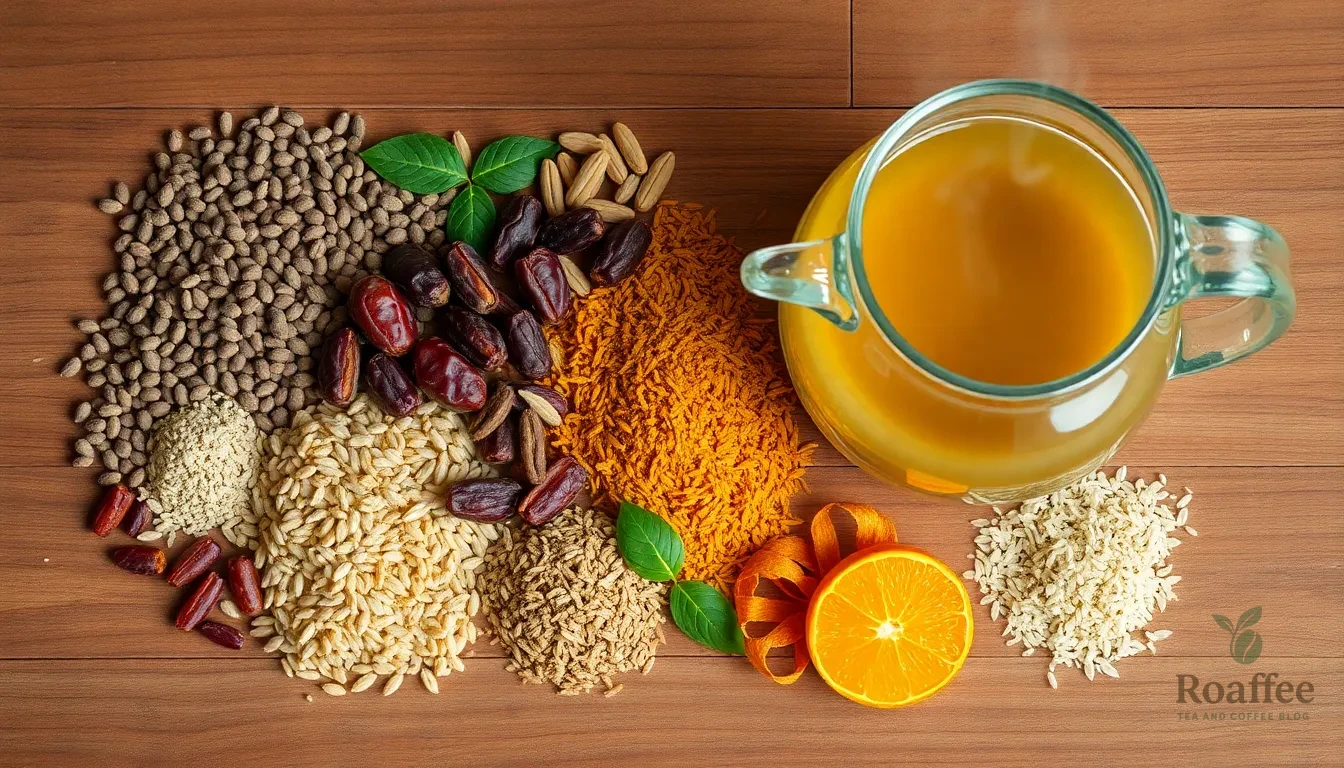
Our thoughtfully curated postpartum tea blend combines traditional herbs with modern nutritional wisdom to support your recovery journey. We’ve selected each ingredient for its exact therapeutic properties and ability to address the unique needs of new mothers during this crucial healing period.
Essential Herbs and Seeds
Cumin Seeds (Jeera)
- 1 teaspoon whole cumin seeds
- Aids digestion and reduces uncomfortable gas buildup
- Supports nutrient absorption during recovery
Fennel Seeds (Saunf)
- 1 teaspoon whole fennel seeds
- Stimulates milk production naturally
- Eases digestive discomfort and bloating
Fenugreek Seeds (Methi)
- ½ teaspoon whole fenugreek seeds
- Enhances milk supply for breastfeeding mothers
- Provides essential nutrients for postpartum recovery
Carom Seeds (Ajwain)
- ½ teaspoon whole carom seeds
- Relieves gas and supports healthy digestion
- Helps with post-delivery abdominal comfort
Coriander Seeds
- 1 teaspoon whole coriander seeds
- Promotes digestive health and reduces inflammation
- Offers calming effects for emotional well-being
Nourishing Additions
Red Dates (Jujube)
- 6-8 pieces, pitted and sliced
- Nourishes blood and restores vital energy
- Improves digestion and provides natural sweetness
Roasted Rice Blend
- 2 tablespoons mixed roasted rice (combination of red, brown, and white rice)
- Supports energy restoration and digestive health
- Provides grounding nutrients for sustained recovery
Chenpi (Dried Orange Peel)
- 1 small piece, about 1 inch
- Enhances digestion and adds citrus notes
- Supports qi circulation according to traditional practices
Preparation Notes
We recommend using organic ingredients whenever possible to ensure maximum therapeutic value. Store all seeds and herbs in airtight containers away from direct sunlight to maintain their potency. Fresh red dates work best, but dried varieties can be substituted with proper soaking beforehand.
| Ingredient | Quantity | Primary Benefit |
|---|---|---|
| Cumin Seeds | 1 tsp | Digestive support |
| Fennel Seeds | 1 tsp | Lactation boost |
| Fenugreek Seeds | ½ tsp | Milk production |
| Carom Seeds | ½ tsp | Gas relief |
| Coriander Seeds | 1 tsp | Calming effects |
| Red Dates | 6-8 pieces | Energy restoration |
| Roasted Rice | 2 tbsp | Digestive health |
| Chenpi | 1 piece | Qi circulation |
Instructions
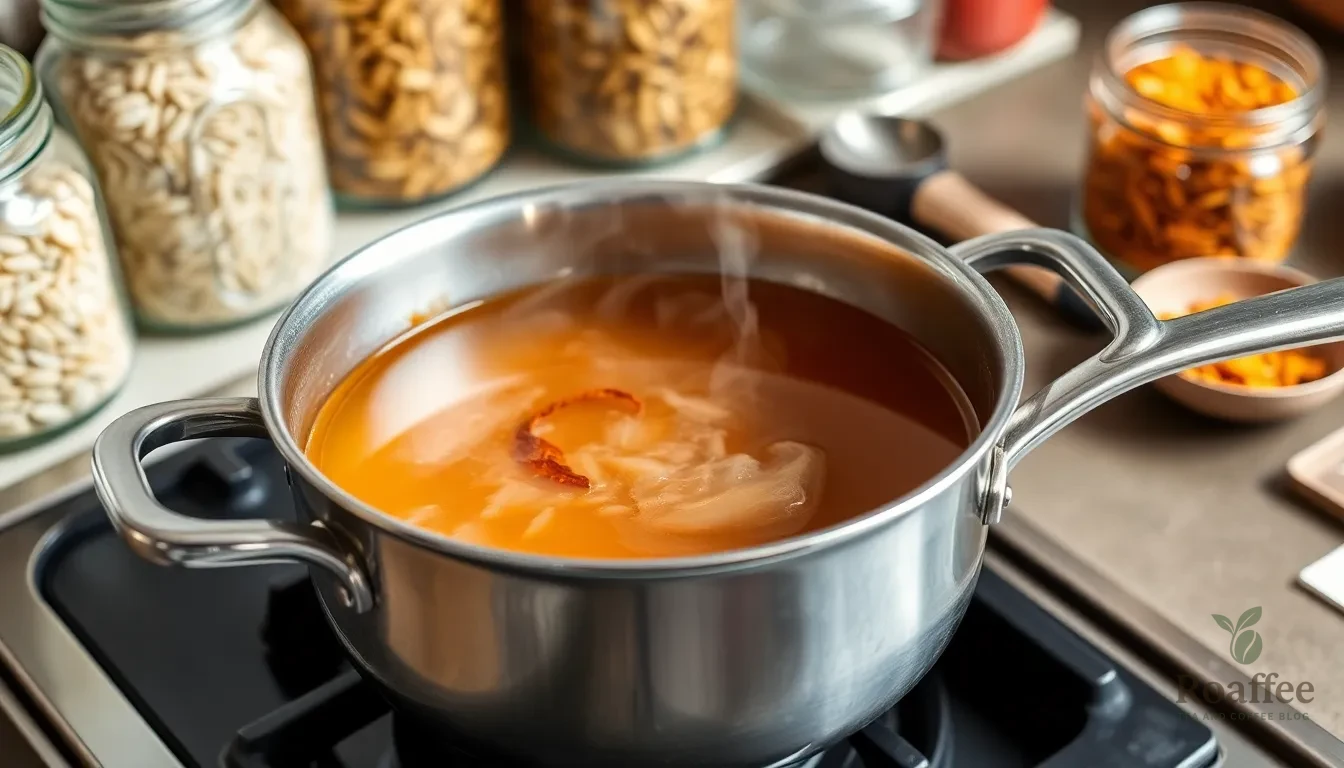
Creating our postpartum tea follows a simple yet traditional process that maximizes the therapeutic benefits of each ingredient. We’ll guide you through each step to ensure you achieve the perfect blend for your recovery needs.
Prep
We begin by preparing our roasted rice blend, which forms the foundation of this nourishing tea. Mix equal parts red rice, brown rice, and white rice in a 1:1:1 ratio without washing them first. Heat a wok or large skillet over low heat and add the rice mixture. Stir occasionally as we roast the grains until the white rice turns golden brown, which typically takes 8-10 minutes. Allow the roasted rice to cool completely before transferring to an airtight jar for storage.
Our chenpi (dried tangerine peel) requires no preparation beyond measuring. We recommend breaking larger pieces into smaller segments to release more essential oils during brewing. Store any unused roasted rice in a cool, dry place where it will maintain its nutty flavor for up to three months.
Brewing
We start the brewing process by bringing 500 ml of water to a rolling boil in our medium-sized saucepan. Add 2 tablespoons of the prepared roasted rice mixture along with 1 piece of chenpi to the boiling water. Reduce heat to medium and allow the mixture to simmer for exactly 20 minutes, stirring occasionally to prevent sticking.
The tea will gradually develop a rich amber color and release aromatic notes of toasted grains and citrus. For enhanced flavor depth, we can let the brewed tea sit for 2 to 8 hours after the initial brewing period. This extended steeping time allows the nutrients to fully extract and creates a more concentrated therapeutic blend.
Straining and Serving
We strain our finished tea using a fine-mesh handheld strainer to remove all solid particles. Pour the clear liquid into heat-resistant mugs for immediate consumption or transfer to mason jars using a funnel for convenient storage.
Serve the tea warm by reheating on the stovetop for 1-2 minutes, or enjoy it as a refreshing iced beverage. Our properly strained tea stores beautifully in the refrigerator for up to 5 days, making it easy to prepare larger batches. We recommend consuming 1-2 cups daily during the first week postpartum when the body requires maximum nutritional support for recovery.
Directions for Cold Brew Method

Cold brewing our postpartum tea creates a gentler extraction process that preserves the delicate beneficial compounds while reducing any potential bitterness from the herbs. We recommend this method for busy new mothers who want to prepare their therapeutic tea in advance.
Start by combining all our dried herbs in a large pitcher or cold brew tea bottle. We use 1 tablespoon each of dried red raspberry leaf, chamomile, ginger root, fennel seeds, and lemon balm for optimal therapeutic benefits. Pour 1 liter of cold filtered water over the herbal mixture and ensure all herbs are fully submerged beneath the water surface.
Cover the pitcher completely and place it in the refrigerator for the steeping process. We allow the mixture to steep for 8 to 12 hours, with overnight steeping being ideal for maximum extraction of beneficial compounds. This extended steeping time allows the herbs to release their therapeutic properties gradually without the risk of over-extraction.
After the steeping period is complete, strain the tea through a fine mesh sieve to remove all herb particles. We press the herbs gently against the sieve to extract any remaining liquid without forcing bitter compounds into our finished tea.
Serve the cold brewed tea immediately over ice or warm it gently if you prefer a hot beverage. Store any remaining tea in the refrigerator for up to 3 days, ensuring we maintain the freshness and potency of our therapeutic blend.
| Cold Brew Specifications | Details |
|---|---|
| Steeping Time | 8-12 hours |
| Water Temperature | Cold filtered water |
| Herb to Water Ratio | 1 tablespoon per 250ml |
| Storage Duration | Up to 3 days refrigerated |
This cold brewing method aligns with traditional loose leaf tea preparation while maintaining the therapeutic integrity of our postpartum blend. The gentle extraction process ensures we receive maximum nutritional benefits while creating a refreshing beverage that supports our recovery journey.
Storage Instructions
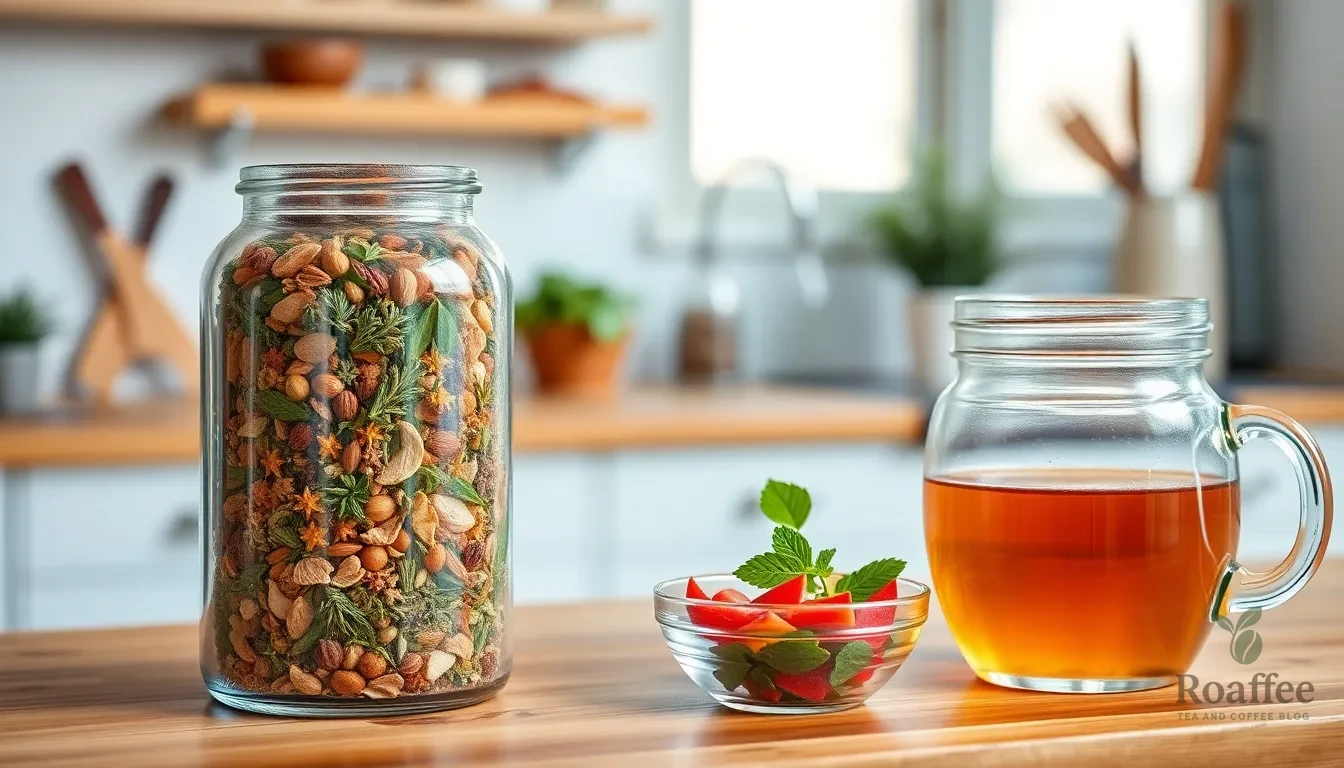
We recommend storing your postpartum tea ingredients and prepared blends properly to maintain their therapeutic potency and freshness. Proper storage ensures that you receive maximum nutritional benefits while extending the shelf life of your herbal ingredients.
Dry Ingredient Storage
Airtight containers serve as the foundation for preserving your postpartum tea herbs and spices. We suggest using glass jars with tight-fitting lids or high-quality ziplock bags to prevent moisture and air exposure. These storage methods protect the delicate essential oils and compounds that provide the tea’s healing properties.
Room temperature storage works best for most dried herbs and spices in your postpartum blend. Keep containers away from direct sunlight, heat sources, and humid areas like above the stove or near the dishwasher. Your pantry or a dedicated spice cabinet provides ideal conditions for maintaining ingredient quality.
Prepared Tea Storage
Refrigeration guidelines for your freshly brewed postpartum tea are straightforward and essential. Store prepared tea in the refrigerator and consume within 1-3 days to ensure optimal freshness and safety. Glass containers work better than plastic for storing brewed tea as they don’t absorb flavors or odors.
Mixing protocols become important when you prepare larger batches of your dry herb blend. We recommend mixing herbs thoroughly before steeping to distribute ingredients evenly throughout the blend. This ensures consistent flavor and therapeutic benefits in every cup you brew.
Storage Timeline Reference
| Storage Method | Duration | Best Practices |
|---|---|---|
| Dry herbs in airtight containers | 6-12 months | Store in cool, dark place |
| Mixed dry herb blends | 3-6 months | Mix well before each use |
| Prepared hot tea (refrigerated) | 1-3 days | Use glass containers |
| Cold brew concentrate | 2-3 days | Keep refrigerated at all times |
Temperature considerations play a crucial role in maintaining your postpartum tea’s quality. Always allow hot tea to cool to room temperature before refrigerating to prevent condensation inside storage containers. This practice prevents moisture buildup that could compromise the tea’s integrity and safety.
When to Drink Postpartum Tea

Timing plays a crucial role in maximizing the therapeutic benefits of postpartum tea throughout your recovery journey. We recommend beginning with gentle formulations immediately after delivery and gradually transitioning to more nutrient-rich blends as your body heals and adjusts.
First 1-5 Days After Delivery
During the immediate postpartum period, your body remains in a vulnerable state requiring gentle nourishment. We suggest starting with our roasted rice tea blend, which helps stabilize your system after the intensity of childbirth. This foundational tea can replace regular water during these critical first days, providing essential support as your body begins its adjustment process.
The Chinese postpartum recovery tea offers exceptional benefits during this phase. Roasted rice combined with dried tangerine peel creates a soothing blend that nourishes both “Qi” and “Blood” according to traditional Chinese medicine principles. Your digestive system benefits from this gentle approach while your energy levels receive crucial support.
First Weeks Postpartum
As you progress through the initial weeks of recovery, herbal teas become increasingly valuable for uterine health and overall healing. Red raspberry leaf tea proves particularly effective during this period, working to tone your uterus and relieve afterbirth pains while promoting healthy uterine contractions that help return your womb to its normal size.
Nettle tea emerges as an excellent choice for combating postpartum fatigue while supporting milk production. Rich in calcium and essential vitamins, nettle provides the nutritional foundation your body needs for muscle recovery and sustained energy throughout demanding days and nights.
Supporting Emotional Well-being and Sleep
Mental health support becomes equally important as physical recovery during the postpartum period. We recommend incorporating lemon balm and chamomile teas into your routine to address anxiety, mood fluctuations, and sleep difficulties that commonly arise during this challenging time.
Chamomile tea offers gentle relaxation properties that can help you unwind after stressful days, while lemon balm provides natural mood-balancing effects. These calming herbs work synergistically to improve sleep quality, which remains essential for both physical recovery and emotional stability.
Throughout Your Recovery Journey
Maintaining consistent tea consumption supports ongoing recovery needs that extend well beyond the initial postpartum weeks. Nutrient-rich herbal blends containing red dates and nettles provide sustained support for physical recovery, muscle health, and bone strength while improving milk production for breastfeeding mothers.
| Recovery Phase | Recommended Tea Type | Primary Benefits |
|---|---|---|
| Days 1-5 | Roasted Rice Tea | Body stabilization, gentle nourishment |
| Week 1-4 | Red Raspberry Leaf | Uterine recovery, afterbirth pain relief |
| Ongoing | Nettle & Red Dates | Milk production, nutritional support |
| As needed | Chamomile & Lemon Balm | Sleep improvement, mood balance |
Different herbs serve exact purposes at various recovery stages, allowing you to customize your tea routine based on your evolving needs. Starting with simple restorative teas and gradually incorporating more complex herbal blends ensures your body receives appropriate support throughout each phase of healing.
Regular consumption of postpartum tea establishes a meaningful self-care ritual that prioritizes your wellness during this groundbreaking period. Whether you choose to sip warm tea throughout the day or prepare cold brew batches for convenience, consistent intake maximizes the therapeutic benefits these carefully selected herbs provide for your recovery journey.
Variations and Customizations

We can easily adapt our postpartum tea recipe to address exact recovery needs and preferences. These customized blends allow us to target particular areas of healing while maintaining the nourishing foundation we’ve established.
Lactation Support Blend
Our lactation support blend focuses on herbs scientifically proven to enhance milk production and quality. We combine 1 tablespoon of fenugreek seeds with 1 tablespoon of fennel seeds as our primary milk stimulating ingredients. Fenugreek seeds work by stimulating milk ducts and increasing milk volume, while fennel seeds provide essential vitamins and ease digestion for both mother and baby.
| Ingredient | Amount | Benefits |
|---|---|---|
| Fenugreek seeds | 1 tablespoon | Stimulates milk ducts, increases milk volume |
| Fennel seeds | 1 tablespoon | Provides vitamins, eases digestion |
| Blessed thistle | 1 teaspoon | Supports milk production |
| Roasted rice base | 2 tablespoons | Aids nutrient absorption |
We steep this blend in 500ml of boiling water for 15-20 minutes to extract maximum lactation benefits. The combination improves milk supply within the first week of regular consumption while supporting digestive health for both mother and nursing baby.
Relaxation Blend
Our relaxation blend incorporates calming herbs that promote emotional well-being and better sleep quality. We start with 2 teaspoons of chamomile flowers and add 1 teaspoon of dried lavender for deep relaxation. Lemon balm provides additional stress relief properties, while red dates nourish blood and support overall recovery.
This soothing combination addresses the anxiety and sleep disruption common during early postpartum recovery. We recommend steeping these herbs for 10-12 minutes to release their full calming potential without creating bitterness. The blend works particularly well when consumed 30 minutes before bedtime to establish healthy sleep patterns.
Energy Boost Blend
Our energy boost blend combines warming spices that stimulate circulation and restore vitality naturally. We use 1 teaspoon of fresh ginger root with 1/2 teaspoon of cinnamon bark to create an energizing foundation. Ginseng adds sustained energy support, while red dates provide natural sweetness and blood nourishment.
| Ingredient | Amount | Benefits |
|---|---|---|
| Fresh ginger root | 1 teaspoon | Warms body, energizes system |
| Cinnamon bark | 1/2 teaspoon | Balances blood sugar, improves circulation |
| Ginseng | 1/4 teaspoon | Provides sustained energy |
| Red dates | 3-4 pieces | Nourishes blood, natural sweetness |
This energizing blend helps combat postpartum fatigue while supporting healthy digestion and circulation. We simmer these ingredients for 20 minutes to extract their full therapeutic potential, creating a warming tea that provides gentle energy without caffeine jitters.
Safety Considerations
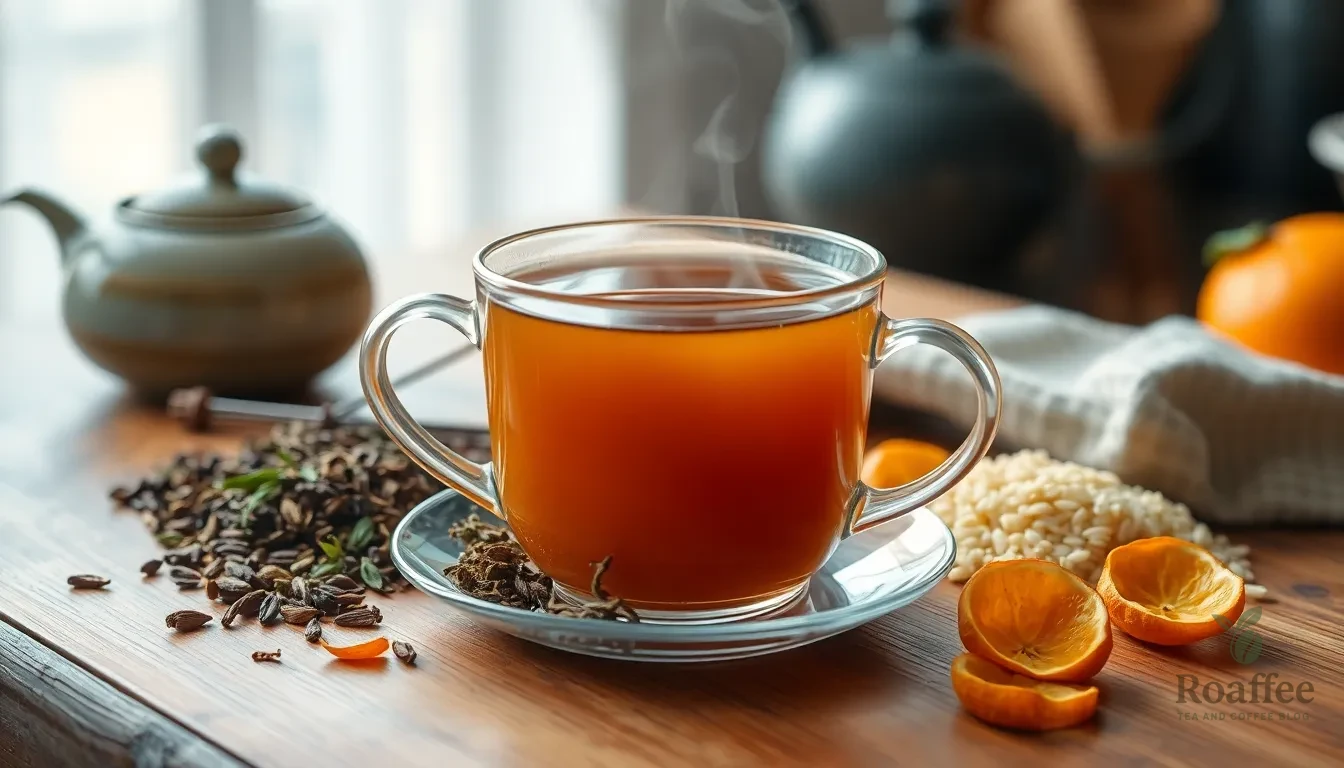
We understand that safety remains our top priority when preparing postpartum tea during this sensitive recovery period. New mothers need to take special precautions to ensure their herbal tea consumption supports rather than hinders their healing journey.
Caffeine-Free Formulation forms the foundation of safe postpartum tea consumption. We recommend avoiding all black tea and green tea varieties that contain caffeine, as these can interfere with rest and potentially affect milk supply. Our herbal blend uses only caffeine-free ingredients like roasted rice and dried tangerine peel to provide gentle nourishment without stimulating effects.
Medical Consultation should occur before beginning any herbal tea regimen during postpartum recovery. We strongly advise speaking with your healthcare provider about your exact tea ingredients, especially if you have existing health conditions or take medications. Your doctor can identify potential contraindications and ensure the herbs align with your individual recovery needs.
Quality Ingredient Selection directly impacts the safety and effectiveness of your postpartum tea. We recommend sourcing herbs from reputable suppliers who provide organic, contaminant-free products. Trusted recipes like our roasted rice and Chenpi blend use time-tested ingredients that have supported generations of new mothers safely.
Proper Hydration Balance requires attention to both tea consumption and water intake during postpartum recovery. We suggest drinking warm water alongside your herbal tea to maintain adequate hydration levels. This approach ensures your body receives sufficient fluids while benefiting from the therapeutic properties of the herbs.
Gradual Introduction allows your body to adjust to new herbal ingredients during the sensitive postpartum period. We recommend starting with simple formulations like our restoring stage tea and gradually adding other herbs as your recovery progresses. This method helps identify any sensitivities while maximizing the therapeutic benefits of each ingredient.
| Safety Timeline | Recommended Action | Duration |
|---|---|---|
| Days 1-5 | Simple roasted rice tea only | First week postpartum |
| Week 2+ | Gradual herb introduction | Monitor body response |
| Throughout | Medical consultation | As needed |
Storage Safety prevents contamination and maintains the therapeutic integrity of your postpartum tea ingredients. We emphasize using airtight containers for dry herbs and proper refrigeration for prepared tea to avoid bacterial growth. Fresh preparation every 24-48 hours ensures optimal safety and potency for your recovery needs.
Make-Ahead Tips

Preparing postpartum tea in advance transforms your recovery routine into a seamless self-care practice. We recommend these strategic preparation methods to ensure you always have nourishing tea available during those demanding early days of motherhood.
Bulk Roasting and Storage
Roast rice in larger quantities to create a foundation for multiple tea batches. We suggest roasting red, brown, and white rice in a 1:1:1 ratio using low heat in your wok until golden brown. Store this roasted rice blend in an airtight jar where it maintains its energy-restoring properties for up to three months. This approach eliminates daily preparation time while ensuring consistent quality in every cup.
Spice Blend Preparation
Create custom spice mixtures by combining cumin, fennel, fenugreek, carom, and coriander seeds in measured portions. We store these blends in small glass containers with tight-fitting lids to preserve their potency. Label each container with the blend ratio and date to maintain organization. These pre-mixed combinations save precious time when you need quick tea preparation during busy moments with your newborn.
Batch Brewing Method
Prepare larger quantities of tea by simmering your roasted rice and dried tangerine peel mixture for 20-30 minutes. We recommend brewing enough tea for 2-3 days at once to maximize efficiency. Strain the tea completely before transferring to glass containers for refrigeration. This method ensures you have ready-to-drink tea that simply needs gentle reheating when desired.
Thermos Strategy
Keep a thermos filled with warm postpartum tea throughout the day to maintain consistent hydration and nutritional support. We find this approach particularly beneficial during nighttime feedings when accessing the kitchen becomes challenging. Fill your thermos with freshly brewed tea each morning and enjoy warm, supportive nourishment whenever needed.
Refrigeration Best Practices
Store prepared tea in the refrigerator for up to three days to maintain freshness and therapeutic benefits. We recommend using glass containers with secure lids to prevent flavor absorption from other foods. Cool hot tea completely before refrigerating to prevent moisture buildup that could compromise the tea’s integrity. Reheat gently on the stovetop or in the microwave before drinking to preserve the beneficial compounds.
| Storage Method | Duration | Container Type | Temperature |
|---|---|---|---|
| Roasted Rice Blend | 3 months | Airtight jar | Room temperature |
| Spice Mixtures | 6 months | Glass containers | Room temperature |
| Brewed Tea | 3 days | Glass containers | Refrigerated |
| Thermos Tea | 12 hours | Insulated thermos | Warm |
These make-ahead strategies ensure you maintain consistent access to nourishing postpartum tea without daily preparation stress. Your recovery journey deserves this level of thoughtful preparation and self-care support.
Conclusion
Creating nourishing postpartum tea becomes a meaningful ritual that supports both physical recovery and emotional well-being during those precious early days of motherhood. We’ve shown you how simple ingredients can transform into a powerful blend that addresses your body’s unique needs while providing moments of calm during change.
The beauty of this recipe lies in its flexibility – whether you’re seeking lactation support energy restoration or simply a moment of peace you can customize each cup to match your recovery journey. With proper preparation and storage techniques you’ll always have this healing tea ready when you need it most.
Remember that caring for yourself isn’t selfish – it’s essential. By incorporating this postpartum tea into your daily routine you’re taking an important step toward honoring your body’s incredible work and nurturing your path to wellness.
Frequently Asked Questions
What is postpartum tea?
Postpartum tea is a carefully crafted herbal blend specifically designed to support new mothers during their recovery period after childbirth. It combines traditional herbs like red raspberry leaf, nettle, chamomile, and ginger to address the unique physical and emotional needs of postpartum women, focusing on enhancing lactation, reducing inflammation, and promoting overall wellness.
When should I start drinking postpartum tea?
You can start drinking postpartum tea immediately after delivery. Begin with gentle formulations like roasted rice tea in the first 1-5 days for body stabilization. Transition to more nutrient-rich blends like red raspberry leaf tea in the following weeks for uterine recovery and enhanced milk production.
What are the main benefits of postpartum tea?
Postpartum tea offers comprehensive support including replenishing essential nutrients, supporting uterine health and hormone regulation, boosting milk supply, promoting better sleep quality, and reducing inflammation. It also provides crucial hydration without caffeine and establishes a meaningful self-care ritual for new mothers.
Which herbs are best for lactation support?
The most effective herbs for lactation support include fenugreek seeds, fennel seeds, and nettle leaf. These herbs have been traditionally used to enhance milk production and supply. Fenugreek is particularly potent for increasing milk volume, while fennel seeds also help with digestive concerns.
How long can I store prepared postpartum tea?
Prepared postpartum tea can be stored in the refrigerator for 2-3 days in airtight glass containers. For dry herb blends, store in airtight containers away from light and moisture for up to 6 months. Always use clean utensils when serving to prevent contamination.
Is postpartum tea safe for breastfeeding mothers?
Yes, postpartum tea is specifically formulated to be safe for breastfeeding mothers. It’s caffeine-free and uses herbs traditionally recognized as safe during lactation. However, it’s always recommended to consult with your healthcare provider before starting any herbal tea regimen, especially if you have existing health conditions.
Can I customize postpartum tea recipes?
Absolutely! You can create custom blends like the Lactation Support Blend (fenugreek and fennel), Relaxation Blend (chamomile and lavender), or Energy Boost Blend (ginger and cinnamon). Each variation targets specific recovery needs while maintaining the nourishing foundation of the original recipe.
How much postpartum tea should I drink daily?
It’s recommended to consume 1-2 cups of postpartum tea daily during the first week postpartum to maximize nutritional support for recovery. You can continue drinking it throughout your postpartum period, adjusting the amount based on your individual needs and comfort level.
